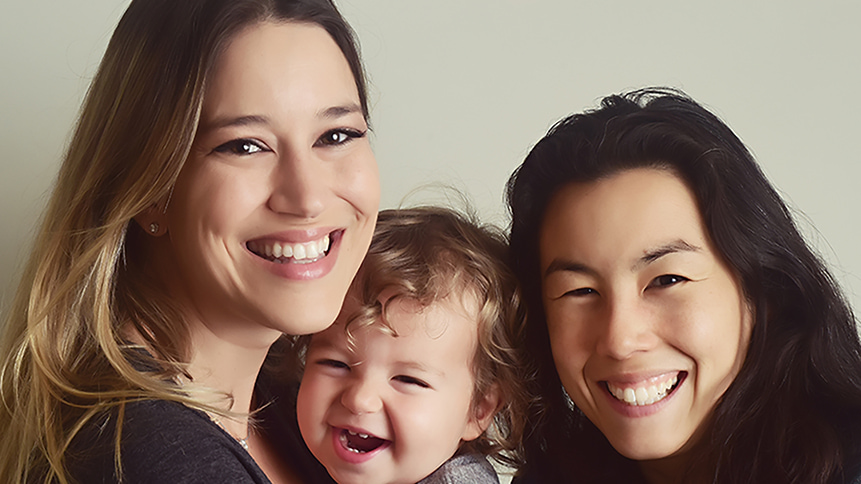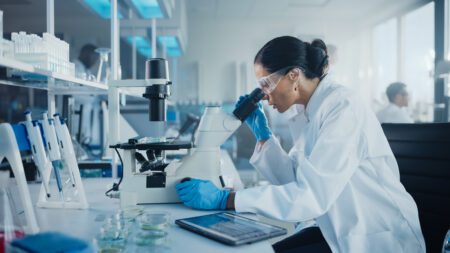
The love story between Talia Osteen and her wife Sara Hess unfolded naturally after they met through a friend at a party. They both have dynamic jobs in the entertainment industry (Talia is a musician in the band The WellSpring and Sara is the Executive Producer of the television show, ‘Orange is the New Black’); and soon after meeting and a 3-week tour with her band, Talia and Sara were a couple.
Things in their relationship developed fast and easily: within 5 months they adopted a puppy together, and moved in together 3 months later. On their 2-year anniversary, they got engaged.
On early dates, Sara and Talia talked about their desire to have children and were well aligned with their family goals. What didn’t come naturally were their next steps creating a family together. They never imagined that they would need countless IVF treatments, or that at age 30, Talia would have DOR (diminished ovarian reserve).
Now they have a beautiful boy named Elliott, and they don’t know whose genetic child he is. For them, this doesn’t matter – they’re his parents.
Here’s their family story…so far:
What’s your fertility/infertility story, in a nutshell?
I’m not great at nutshells, but I’ll do my best:
When Sara was diagnosed with breast cancer a few months before our wedding, the doctor recommended we speak with a fertility doctor and get the ball rolling there in case she needed chemotherapy or radiation, as we’d want to do an egg retrieval before those treatments to protect her eggs. When we met with the doctor, we both got tested to get a picture of where our fertility was at, and unfortunately, both our results came back looking pretty dire. Though I’m 9 years younger than Sara and was only 30 at the time, my FSH was high, and my AMH levels were “undetectable.” Those blood test results matched with a low antral follicle count in an ultrasound, and essentially led to the diagnosis of Premature Ovarian Failure, aka a Diminished Ovarian Reserve at a young age. Sara’s levels were slightly better than mine, despite the age gap predicting otherwise. It was a devastating blow, especially in the midst of dealing with Sara’s cancer. Sara had a single mastectomy and was cancer free before our wedding. It all happened so fast. Then we turned our focus to our infertility issues.
Of all the things that could go wrong with my health, fertility felt particularly cruel. I curled up on the couch and sobbed uncontrollably for days when I thought I would never have my own (read: biological) child.
Sara did 6 egg retrievals & fertilizations total, and I did 4, tried twice more but cancelled them as I had stopped responding to the medication. Sara did a couple retrievals at one fertility clinic that grew the embryos to blastocyst & then did genetic testing. Only one out of 8 blastocysts tested as totally healthy. I did a cycle at that clinic as well, but of the 4 eggs they retrieved, 2 fertilized and neither made it to the blastocyst stage. This led us to move to a different fertility clinic whose philosophy was not to do genetic testing (particularly because we weren’t getting a ton of eggs each time, and they didn’t want to risk any procedure that might increase the chance of losing the embryo). At USC Fertility, Sara did 4 retrievals and I did 3 more. We froze mine at Day 3 rather than Day 5 (blastocyst) not wanting to risk losing them in the lab. I had 10 embryos frozen total. We put Sara’s embryos in fresh after each of her retrievals. She got pregnant 3 times and had 2 chemical pregnancies & one miscarriage at 7 weeks. It was devastating. We had high hopes that transferring the genetically tested healthy blastocyst would work; but sadly, that was only a chemical pregnancy and the embryo never developed.
At that point, we decided to do her last egg retrieval, from which she got 2 embryos. Our doctor encouraged us to consider using 2 of my frozen embryos to implant along with Sara’s 2 fresh ones, which is what we did. And that’s what worked! We now have a beautiful, healthy, happy 20-month-old son, Elliott Dashiell. We haven’t done genetic testing to determine which embryo he came from, so he could be either of ours genetically. He’d be ¼ Korean if he is from Sara’s genes, so we thought we’d know right away, but it was actually really hard to tell! At first he looked like her, now he looks a lot like me as a child, but we’ve decided not to check yet as it doesn’t really matter – he’s his own amazing person and he’s our son regardless of his genes.
How soon into your relationship did you discuss having kid(s)? Did you ever imagine how much you’d have to go through to make a baby?
I told Sara I wanted kids on our first date. And she wanted a second date, so I guess that didn’t scare her off! I’ve always wanted to have kids and have looked forward to it for as long as I can remember, which is why it felt like a personal attack when I got my infertility diagnosis. Of all the things that could go wrong with my health, fertility felt particularly cruel. I curled up on the couch and sobbed uncontrollably for days when I thought I would never have my own (read: biological) child. After I had time to absorb everything, I realized that motherhood is not dependent on genetics, and I became comfortable and excited by the idea of having a child that was genetically Sara’s, or if that didn’t work than adopting a child and/or using an egg donor. My brother graciously offered to donate sperm for Sara’s eggs, so we could have a child related to both of us (more on that later). In the end, I realized I would have my own children, no matter what, even if they didn’t come to me the way that I’d imagined.
Losing pregnancies is devastating for any couple. Simultaneously feeling like the clock is ticking for the partner who isn’t carrying, but who is potentially could, is a strain on the whole thing that’s unique to lesbian couples.What did you learn about infertility through your experience?
Ha, we could write a book! The big takeaway is that it’s still very much a new science – it’s not exact, and no one has all the answers. Deciding which protocol to pursue, and when to stop pursuing it, is very personal. I think it’s important to find a doctor that you trust will be honest with you and not string you along down a path that is very expensive and unlikely to work (if that’s the case); someone who will give you all the statistics and variables and help you make a responsible decision. We were very fortunate to be able to afford all the egg retrievals we did. On one hand, if Elliott isn’t Sara’s genetic child, then we spent an exorbitant amount of money on Sara’s retrievals without success. On the other hand, we have the peace of mind of knowing we tried everything we could and there are no “what ifs.” And it’s quite possible that he’s a result of her last retrieval effort. But we were prepared to know that it could all be for naught, and we had backup plans ready. For myself, I needed to know plan B, C, D, and E and get my head in a place where I’d be happy with any of them. Sara did not like to think that far out as she wanted to take it one step at a time. Everyone copes differently, and it’s important to be sensitive to how your partner processes everything and make sure that you support one another.
How did you both balance treatments during your busy work schedules?
I’m lucky that I work from a home studio as a composer & my writing partner and I cover for each other when family/kids stuff comes up. Sara was lucky to be working on Orange Is The New Black when she was going through both the breast cancer & the fertility treatments & that production was run by women pretty much from the top down. They were very understanding and flexible about time she had to miss for doctor appointments. We need more feminists in charge of workplaces so this becomes the norm! 🙂
How did you decide which donor to work with? How did you decide who would do treatment/carry the pregnancy?
We used two different donors. Because my diagnosis seemed so dim, and I feared I’d never have a genetically related child, my brother offered to be a donor for Sara’s embryos, that way we’d have a baby related to both of us. We went back and forth on this, because we’d originally thought we’d use the same donor for both our eggs, but now that we weren’t sure I’d have any viable eggs, we decided to use my brother’s genetic material for Sara’s eggs as his was “99.999% the same as” mine, as he put it. He was able to look at it purely scientifically – it was DNA coding, it was almost identical to mine, and if it was the only way I could have a child related to me, he’d happily give me that gift. I have friends that are identical twins and they put my mind at ease about it, pointing out that their DNA is literally identical, so if you only look at that, each of their children are genetically both of theirs. Of course, it makes you realize that the genes are not what makes a parent a parent.
For my eggs, we used an anonymous donor through a cryobank. I looked through more than 700 profiles from 4 different sperm banks and narrowed it down to the top 10. Sara weighed in from there (can you tell which one of us is the, perhaps a bit obsessive, planner in the family?). TIP: If you can afford to, pay the extra to hear the audio interview of the donor if they offer that – it tipped the scale for us as we chose a donor who was well-spoken, sounded really at ease, happy and confident. Plus, from their interaction it seemed like the interviewer was charmed and maybe even crushing out on him a bit, so we figured he must be charismatic and cute 😉
If you can afford to, pay the extra to hear the audio interview of the donor if they offer that – it tipped the scale for us as we chose a donor who was well-spoken, sounded really at ease, happy and confident.It was important to Sara to get pregnant first as she is older, and she felt that I was more naturally maternal and she didn’t want to feel left out of the pregnancy and early bonding with a child, feeling that she wanted the experience and the hormones and all of it to bond her to the baby. It became a difficult decision when I felt I was running out of time and we kept losing pregnancies and I just wanted to start doing IUI since I wasn’t responding to IVF medication anymore. On one hand, I had 10 embryos frozen, but on the other hand, I knew nothing about the quality of those eggs and if they’d work or not, and we knew we wanted multiple kids. That was the hardest part of the process for us.
Throughout the whole rollercoaster of egg retrievals and fertilizations, we’d both been very supportive of one another. We were in it together. The first two implantations we felt like a team. By the third loss, things became hard as all the anxiety about my own ability to get pregnant, and our ability as a family to have a child at all started eating away at my patience with the process and made it harder for me to focus on Sara’s experience having carried the embryos.
Losing pregnancies is devastating for any couple. Simultaneously feeling like the clock is ticking for the partner who isn’t carrying, but who potentially could, is a strain on the whole thing that’s unique to lesbian couples. To me it felt like we didn’t have time to fully mourn the losses before trying to figure out what we could do to increase our chances of a pregnancy moving forward. The planning for the next step was part of how I coped with the losses. I know Sara felt rushed emotionally, and that was awful.
In the end, transferring both our embryos into Sara worked, to our great relief. We have a healthy child and that’s obviously the most important thing, but also Sara was able to have the pregnancy she wanted, and I still have enough embryos frozen to be able to try for my own pregnancy/pregnancies for our next child or two.
Anything else you want to add about your family story?
We’ve both become evangelical about telling our single friends who think they want children in the future to freeze their eggs before they’re 35, if they can afford it. The younger the better, because the age factor really is an issue. Our advice is to think of it as an insurance policy. You can pay it off monthly. Don’t wait until you are actually ready to have kids to think about it; by then you could have a much harder time getting pregnant. I’m so grateful that I checked my fertility with a specialist when I was 30-years-old, because if I’d waited until 35, it would have been too late. Most women won’t have the issues we had; but it’s worth checking out for peace of mind and ability to plan ahead.

Listen to stories, share your own, and get feedback from the community.


















